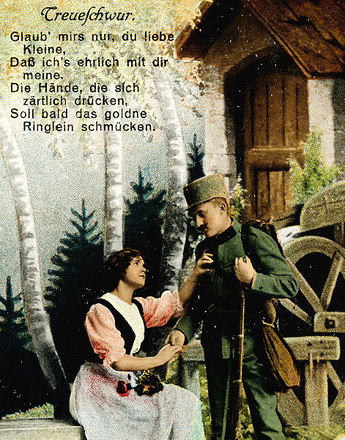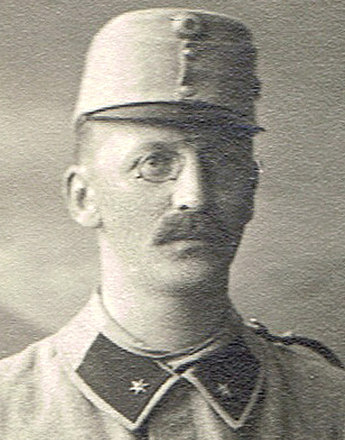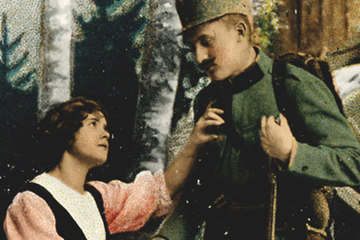As was the case in many wartime correspondences, in their letters to one another Mathilde and Ottokar Hanzel evoked memories of happier times before the war and contemplated their future after the end of the conflict. Looking back on their shared past and forwards to a shared future helped them in part to overcome the pain of separation in war, giving them comfort and making the gruelling conditions of everyday life in wartime – even if only for a short time – seem more bearable.
The plans for their future that they shared in their letters focused primarily on being together as a family again, everyday life with the children and an active shaping and living out of their marital relationship. They recall shared experiences as well as the beginning and growth of their love for each another. Mathilde Hanzel wrote for example: ‘I can’t say any more exactly when I felt I loved you. [...] I think it was already the case even before the holidays in 1904. I had a great regard for you and was glad that you liked studying with me, [...]. Once, when I already realized how much you had come to mean to me, I asked you whether you thought that two people /a woman and a man/ could work together and meet frequently without loving one another. You said quite decidedly: I consider that absolutely out of the question. (That is, that they would not become lovers.) I had to smile, for with that you staked everything on your head and mine ... Darling, how wonderfully it all turned out [...].’
In their correspondence the Hanzels resorted to familiar turns of speech and images. This established a closeness and intimacy between them that was also expressed in the imagery of dreams. In a letter dated 12 December 1917 Mathilde Hanzel writes: ‘I am just as tired as I am full of longing, and so I will compose myself upon the pillows and wait – for you to come! You will embrace me in my dreams!’
The attempt to establish closeness and intimacy in their letters also included communications touching on the couple’s physicality and sexuality. This was rare in wartime correspondence, but touched on several times in Mathilde and Ottokar Hanzel’s letters. However, the imagining of intimate congress between the couple remained within the bounds of certain norms and conventions, serving to paraphrase rather than expressly name it.
As the historian Martin Humburg has already established for the majority of letters sent between the frontline and the home front during the Second World War, their 'subject matter was mostly about love and partnership’. This is also true of the correspondence between Mathilde and Ottokar Hanzel from the First World War.
Translation: Sophie Kidd
Hämmerle, Christa: Entzweite Beziehungen? Zur Feldpost der beiden Weltkriege aus frauen- und geschlechtergeschichtlicher Perspektive, in: Didczuneit, Veit/Ebert, Jens/Jander, Thomas (Hrsg.): Schreiben im Krieg. Schreiben vom Krieg. Feldpost im Zeitalter der Weltkriege, Essen 2011, 241-252
Humburg, Martin: Feldpostbriefe aus dem Zweiten Weltkrieg – Werkstattbericht einer Inhaltsanalyse (= Zeitschrift für Historische Sozialforschung 1998), 8. Unter: http://hsozkult.geschichte.hu-berlin.de/beitrag/essays/feld.htm (18.06.2014)
Knoch, Peter (Hrsg.): Kriegsalltag. Die Rekonstruktion des Kriegsalltages als Aufgabe der historischen Forschung und Friedenserziehung, Stuttgart 1989
Rebhan-Glück, Ines: „Wenn wir nur glücklich wieder beisammen wären …“ Der Krieg, der Frieden und die Liebe am Beispiel der Feldpostkorrespondenz von Mathilde und Ottokar Hanzel (1917/18), Unveröffentlichte Diplomarbeit, Wien 2010
Rebhan-Glück, Ines: Liebe in Zeiten des Krieges. Die Feldpostkorrespondenz eines Wiener Ehepaares (1917/18), in: ÖGL (2012), 56/3, 231–246
Sturm, Margit: Lebenszeichen und Liebesbeweise aus dem Ersten Weltkrieg. Zur Bedeutung von Feldpost und Briefschreiben am Beispiel der Korrespondenz eines jungen Paares. Unveröffentlichte Diplomarbeit, Universität Wien 1992
Quotes:
„I can’t say any more exactly when I felt I loved you...“: Mathilde Hanzel to Ottokar Hanzel, n. d., Sammlung Frauennachlässe, Nachlass 1, Institut für Geschichte der Universität Wien (Translation: Sophie Kidd)
„I am just as tired as I am full of longing ...“: Mathilde Hanzel to Ottokar Hanzel, 02.12.1917, Sammlung Frauennachlässe, Nachlass 1, Institut für Geschichte der Universität Wien (Translation: Sophie Kidd)
„[…] was mostly about love and partnership’“: Humburg, Martin: Feldpostbriefe aus dem Zweiten Weltkrieg – Werkstattbericht einer Inhaltsanalyse (= Zeitschrift für Historische Sozialforschung 1998), 8. URL: http://hsozkult.geschichte.hu-berlin.de/beitrag/essays/feld.htm (18.06.2014)
-
Chapters
- How does a collection of letters come to be stored in an archive?
- The protagonists: Mathilde Hübner and Ottokar Hanzel
- Love, marriage, career
- The separation begins
- ‘War fever’ versus the longing for peace
- Italy’s ‘betrayal’ in 1915
- ‘… surely this war must end some time?!’
- ‘… and tomorrow we will start cheerily canvassing for peace.’
- Black marketeering, profiteering and self-subsistence
- A love affair in wartime
















